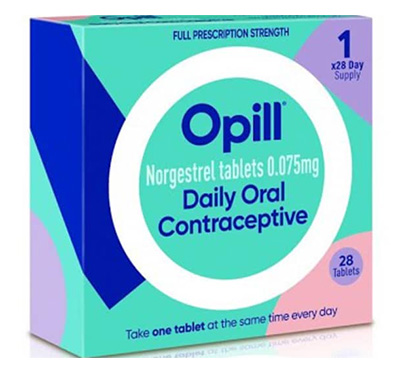First over-the-counter birth control pill approved by FDA: What patients need to know
Consumers will be able to buy Opill without a prescription
On Thursday, the Food and Drug Administration (FDA) announced the approval of Opill (norgestrel). The birth control pill is used to prevent pregnancy and will be available without a prescription.
This means consumers will be able to buy birth control pills over the counter (OTC) at drug stores, convenience stores, grocery stores and online.
“Today’s approval marks the first time a nonprescription daily oral contraceptive will be an available option for millions of people in the United States,” Patrizia Cavazzoni, director of the FDA’s Center for Drug Evaluation and Research, said in a statement. “When used as directed, daily oral contraception is safe and is expected to be more effective than currently available nonprescription contraceptive methods in preventing unintended pregnancy.”
Opill is made by the pharmaceutical company Perrigo. The company announced the progestin-only pills are expected to be in stores and available online in early 2024. The price for a one-month supply has not been announced.
Drug maker says pill will be affordable and easy to get
At a news briefing on Thursday, Frederique Welgryn, Perrigo global vice president for women’s health, said the company is “committed to ensuring that Opill is affordable and accessible to people who need it.”
A study published earlier this year in JAMA Network Open found in 2021 almost half (45%) of people seeking reproductive health care services experienced at least one barrier to access, and 19% experienced up to three barriers.
“Having over-the-counter access to this progestin-only pill increases patients’ ability to obtain contraception that is more effective than other OTC methods like condoms or spermicides,” said Melissa Chen, an associate professor in the UC Davis Department of Obstetrics and Gynecology. “This will be a convenient option, especially for those who have difficulty getting clinic appointments or prescriptions and refills.”
According to the nonprofit Free the Pill, birth control pills are already available over the counter in more than 100 countries, including Mexico and the United Kingdom. But in the U.S., birth control pills have only been available by prescription since they were first approved in 1960. Norgestrel, the active ingredient in Opill, was approved for prescription use in 1973.
Having over-the-counter access to this progestin-only pill increases patients’ ability to obtain contraception that is more effective than other OTC methods like condoms or spermicides.”—Melissa Chen, associate professor, Department of Obstetrics and Gynecology
Pills only contain one hormone
Progestin-only birth control pills are sometimes known as POPs. The pills contain only one hormone, progestin, and are estrogen-free.

“Progestin-only pills are safer compared to combination birth control pills that contain both progestin and estrogen,” said Chen. “Progestin-only pills don’t have the same risks of blood clots or stroke as combination pills.”
Mitchell Creinin is a professor in the UC Davis Department of Obstetrics and Gynecology and director of the Complex Family Planning Fellowship program at UC Davis Health. “Even with combination pills, serious complications are rare. And significant health complications are incredibly unlikely with POPs,” Creinin said.
According to the American College of Obstetricians and Gynecologists, progestin-only pills like Opill help prevent pregnancy in many ways. The pills make it difficult for sperm to enter the uterus. They also thin the lining of the uterus and stop ovulation for many people who take it. To be effective in preventing pregnancy, the pills must be taken at the same time every day.
The most common side effects of such pills include irregular bleeding, headaches, dizziness, nausea, increased appetite, abdominal pain, cramps or bloating. Other hormonal side effects include acne and mood changes.
Some people should not take Opill
Although people will be able to purchase Opill without a visit to their doctor, Chen cautions that some people should not take the medication.
“People who suspect they are pregnant or have breast cancer or another progestin-sensitive cancer should not take it. The pill could also be less effective in people who are taking certain medications that have drug interactions with the pill — such as medications for epilepsy or antibiotics for tuberculosis,” Chen said. Other medications that can interfere with birth control pills include anti-HIV drugs, some antifungal drugs, and even some herbs, like St. John’s Wort.
Chen encourages patients to discuss any medications they are taking with their doctors.
Preventing unwanted pregnancies
In their statement Thursday, the FDA addressed the potential effect of Opill on unintended pregnancies.
“Nonprescription availability of Opill may reduce barriers to access by allowing individuals to obtain an oral contraceptive without the need to first see a health care provider. Almost half of the 6.1 million pregnancies in the U.S. each year are unintended. Unintended pregnancies have been linked to negative maternal and perinatal outcomes, including reduced likelihood of receiving early prenatal care and increased risk of preterm delivery, with associated adverse neonatal, developmental and child health outcomes. Availability of nonprescription Opill may help reduce the number of unintended pregnancies and their potential negative impacts.”
For more information, view the FDA announcement on their website.



